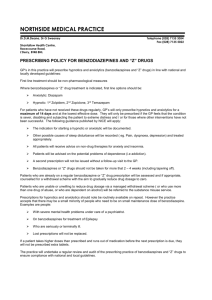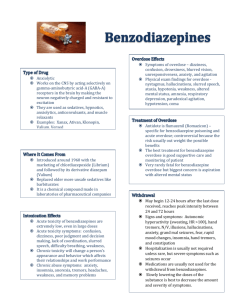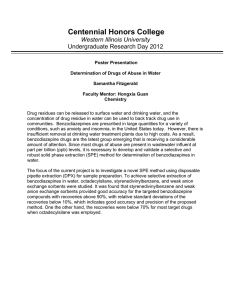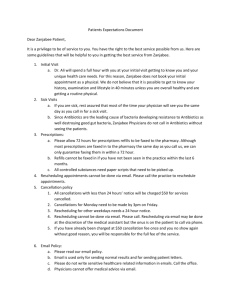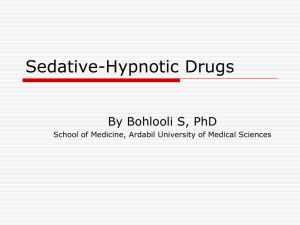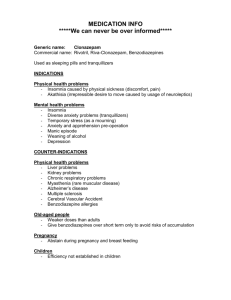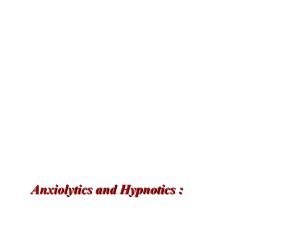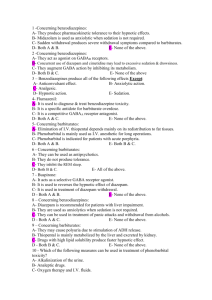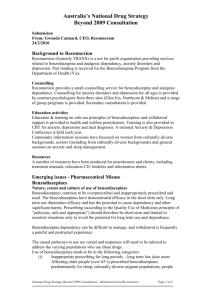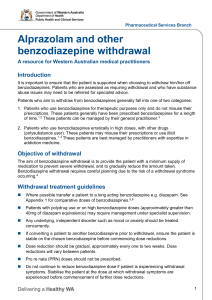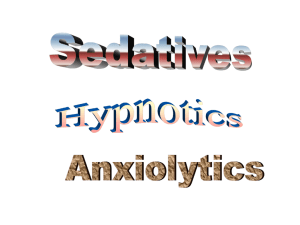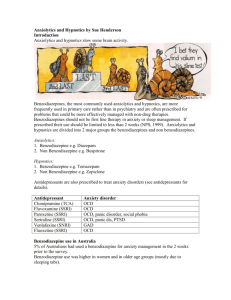example practice protocol for benzodiazepines and z
advertisement
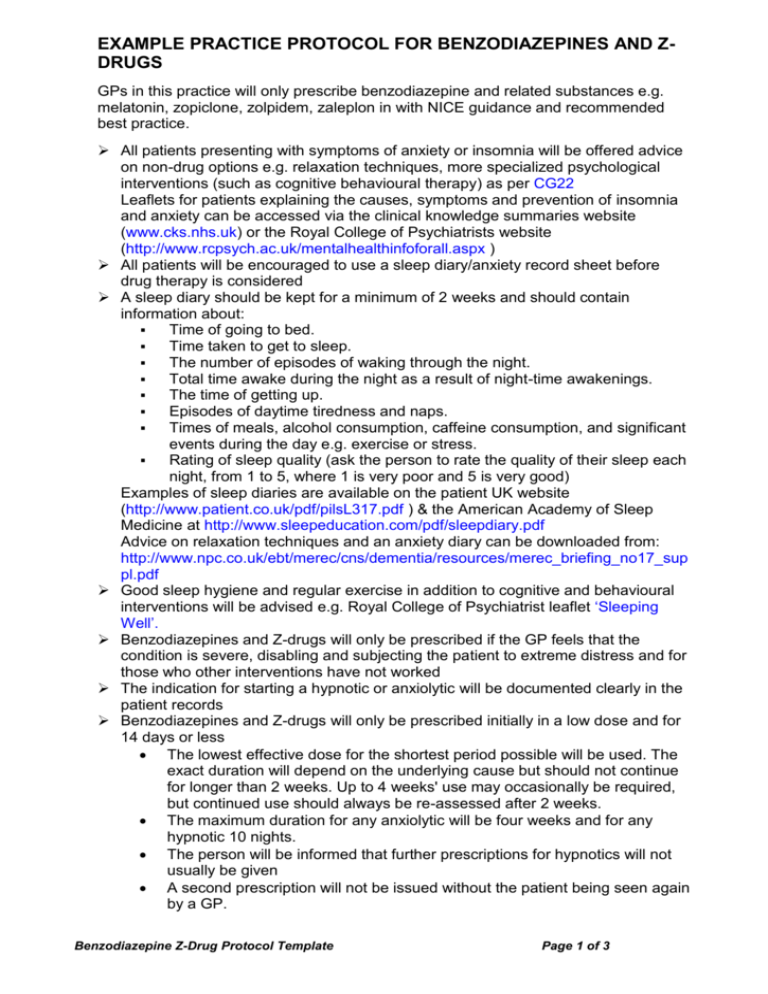
EXAMPLE PRACTICE PROTOCOL FOR BENZODIAZEPINES AND ZDRUGS GPs in this practice will only prescribe benzodiazepine and related substances e.g. melatonin, zopiclone, zolpidem, zaleplon in with NICE guidance and recommended best practice. All patients presenting with symptoms of anxiety or insomnia will be offered advice on non-drug options e.g. relaxation techniques, more specialized psychological interventions (such as cognitive behavioural therapy) as per CG22 Leaflets for patients explaining the causes, symptoms and prevention of insomnia and anxiety can be accessed via the clinical knowledge summaries website (www.cks.nhs.uk) or the Royal College of Psychiatrists website (http://www.rcpsych.ac.uk/mentalhealthinfoforall.aspx ) All patients will be encouraged to use a sleep diary/anxiety record sheet before drug therapy is considered A sleep diary should be kept for a minimum of 2 weeks and should contain information about: Time of going to bed. Time taken to get to sleep. The number of episodes of waking through the night. Total time awake during the night as a result of night-time awakenings. The time of getting up. Episodes of daytime tiredness and naps. Times of meals, alcohol consumption, caffeine consumption, and significant events during the day e.g. exercise or stress. Rating of sleep quality (ask the person to rate the quality of their sleep each night, from 1 to 5, where 1 is very poor and 5 is very good) Examples of sleep diaries are available on the patient UK website (http://www.patient.co.uk/pdf/pilsL317.pdf ) & the American Academy of Sleep Medicine at http://www.sleepeducation.com/pdf/sleepdiary.pdf Advice on relaxation techniques and an anxiety diary can be downloaded from: http://www.npc.co.uk/ebt/merec/cns/dementia/resources/merec_briefing_no17_sup pl.pdf Good sleep hygiene and regular exercise in addition to cognitive and behavioural interventions will be advised e.g. Royal College of Psychiatrist leaflet ‘Sleeping Well’. Benzodiazepines and Z-drugs will only be prescribed if the GP feels that the condition is severe, disabling and subjecting the patient to extreme distress and for those who other interventions have not worked The indication for starting a hypnotic or anxiolytic will be documented clearly in the patient records Benzodiazepines and Z-drugs will only be prescribed initially in a low dose and for 14 days or less The lowest effective dose for the shortest period possible will be used. The exact duration will depend on the underlying cause but should not continue for longer than 2 weeks. Up to 4 weeks' use may occasionally be required, but continued use should always be re-assessed after 2 weeks. The maximum duration for any anxiolytic will be four weeks and for any hypnotic 10 nights. The person will be informed that further prescriptions for hypnotics will not usually be given A second prescription will not be issued without the patient being seen again by a GP. Benzodiazepine Z-Drug Protocol Template Page 1 of 3 The elderly are particularly vulnerable to adverse drug reactions: if prescribing is considered essential, doses less than half of those normally recommended will be used All patients will be advised about the potential for dependence & given a copy of the letter to new users plus Patient UK Leaflet on ‘Benzodiazepines & Z Drugs’: this will be documented in their records All new prescriptions for benzodiazepines/Z-drugs will be prescribed on the acute rather than the repeat medication screen Patients who have not responded to one of the hypnotics will not be prescribed any of the other hypnotic drugs (TA77) All patients discharged from hospital on a benzodiazepine/Z-drug will have their records checked to see if they were previously on such a drug: if not the drug will not be added to their list of medication The first choice of hypnotic is: ………………………… (insert name and dose) The first choice of anxiolytic is: ……………………….. (insert name and dose) Consideration may be given to prescribing in instalments (either repeat dispensing or as for illegal drug addicts) Patients who are already on a regular benzodiazepine or z-drug prescription will be assessed and counselled with a view to reducing or stopping the dose at least annually Patients on benzodiazepines for over 3months will be sent a copy of the letter to long term users plus the Patient UK Leaflet on ‘Stopping Benzodiazepines & Z Drugs’: this will be documented in their records If it is appropriate to withdraw a chronic user from a benzodiazepine or Z Drug the patient will be transferred to an equivalent dose of diazepam (UKMI Q&A 293.1). This dose will then be gradually tapered off by 2mg diazepam equivalent every 2 weeks There may be a small minority of people who need to be on a small maintenance dose of benzodiazepine. Examples are: People with severe mental health problems People receiving benzodiazepines for management of epilepsy Those who are seriously or terminally ill People receiving benzodiazepines as part of substance withdrawal The rationale for continued use will be documented in the patients’ records Prescriptions will not be given in emergency surgeries or out of hours Lost prescriptions will not be replaced Temporary residents who are regular users will not be prescribed for without proof of dosage, frequency and date of last prescription. This can be faxed from the patient’s surgery. Temporary residents requesting new treatment will be treated according to these guidelines Benzodiazepine Z-Drug Protocol Template Page 2 of 3 References Clinical Knowledge Summaries (2009a) Insomnia [Accessed via www.cks.nhs.uk on May 12th 2010] Clinical Knowledge Summaries (2009b) Benzodiazepine & Z Drug Withdrawal [Accessed via www.cks.nhs.uk on May 12th 2010] National Institute for Clinical Excellence (2004) Guidance on the Use of Zaleplon, Zolpidem & Zopiclone for the Short Term Management of Insomnia TA77. London National Institute for Health & Clinical Excellence (2007) Anxiety: management of anxiety (panic disorder, with or without agoraphobia, and generalised anxiety disorder) in adults in primary, secondary and community care. CG22 (Amended). London National Prescribing Centre (2002), Good Sleep Guide, Good Relaxation Guide& Other Resources MeReC Briefing 17(suppl) Royal College of Psychiatrists. Sleeping Well. [Accessed via http://www.rcpsych.ac.uk on May 12th 2010] St Helen’s Primary Care Trust. A Protocol for Prescribing & Withdrawing Benzodiazepines UKMI (2010). What are the Equivalent Doses of Oral Benzodiazepines? Q&A 293.1[Accessed via www.nelm.nhs.uk on May 12th 2010 Benzodiazepine Z-Drug Protocol Template Page 3 of 3
